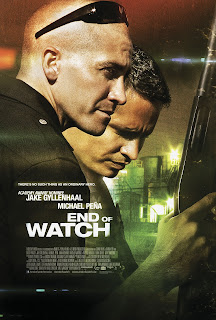The plot of Iron Man 3 exists as an excuse to bounce around from one obligatory action sequence to another and nothing more. Essentially, it's the same as in the first two movies. In the past, Tony Stark (Robert Downey Jr.) made some guy angry (justifiably, this time), and that guy turned out to be a mad scientist interested in genetic research who created his own version of the iron man (resembling another Marvel superhero, the Human Torch, from Fantastic Four) to combat Stark and rule the world. In that sense, I got exactly what I expected. The only pleasant surprise the film contains is that at one point in the movie Iron Man is "killed" and Stark is thus able to disappear to the middle of nowhere where he befriends a kid who just happens to be Iron Man's number one fan and smart enough to help him rebuild the suit. The back and forth banter is delightful as the kid proves to be Stark's equal in conversation and their scenes together become the highlight of the film and keep the tone light enough to balance the darker aspects of the movie such as Stark's depression and panic attacks which he experiences due to his near-death incident in "The Avengers."
I don't need for all of my superhero films to be deep and intricately constructed stories. I like a simple good vs. evil battle. However, Iron Man 3 falls short in the most important area for a superhero movie. Ultimately, it doesn't have a compelling villain. Where Jeff Bridges and Mickey Rourke brought genuine menace to their disgruntled antagonists, Guy Pearce just seems like a whiny kid in comparison. He doesn't inspire fear. As for the Mandarin, he ends up being the biggest disappointment in the film as he turns out to be more of a punchline than a commentary on modern global terrorism which it attempts to be.
The best thing the movie has going for it is the breathtaking, CGI infused action, which is the reason the film was even made: to enchant worldwide audiences who can universally enjoy watching stuff blow up. The "barrel of monkeys at 18000 feel" scene in which Stark rescues a dozen of free falling bodies is ingenious. Also, the pulverization of Tony's mansion merits praise and is a great feat of special effects. Finally, the smaller, back to basics, Tony-with-a-gun-and-some-toys-he-bought-at-the-store, are great fun even though they' re in a completely different scale from the rest of the movie.
As always, Colonel James Rhodes, or Iron Patriot, joins Stark to blow things up. A lot is made out of the fact that his name went from War Machine to Iron Patriot. It's a joke that works the first time, but is given too much weight and becomes irritating by the fourth time. Aside from that, Don Cheadle is as funny as ever. Too bad there wasn't a scene with the Rhodes Stark and the kid.
Finally, Pepper Potts does get her second in the spotlight, and she gets the most to do here out of all the films she's been in. She even becomes "iron woman" for a scene! Still, I would have liked to see more of her. Part of my disappointment has to do with the fact that the trailers made me think that she would play a more essential role, but even if I hadn't been misled by the publicity, I still feel that the character, and the wonderful actress that plays her (Gwyneth Paltrow) deserve a better storyline than being merely the exasperated girlfriend of a superstar/superhero or at the very least, she deserved some more screen time.
The movie, as all blockbusters nowadays, ends with a post credit scene that gives director Shane Black an excuse for Stark to narrate the movie. It was a nice touch, but since he was going to imitate his other feature with Robert Downey Jr, Kiss Kiss Bang, Bang, Black should have gone further. I would have liked more interruptions from Stark and would have liked to see him as a different character from the depressed Stark within the story, and more like his old self (since he is narrating from a time when he's been cured of his depression). There was a lot of unexplored potential here just like with the Mandarin and Pepper Potts.
Iron Man 3 attempts to be fresh, quick paced and clever, but it feels a little bloated and the dialogue , full of one-liners, is very hit and miss and not quite up to the standard I expected from Kiss Kiss Bang Bang and the two previous Iron Man movies. This is an entertaining movie, not a great one, but still a decent way to start the summer.
Verdict- 2.5/4
Iron Man 3 (2013) 2h 10 min PG-13








